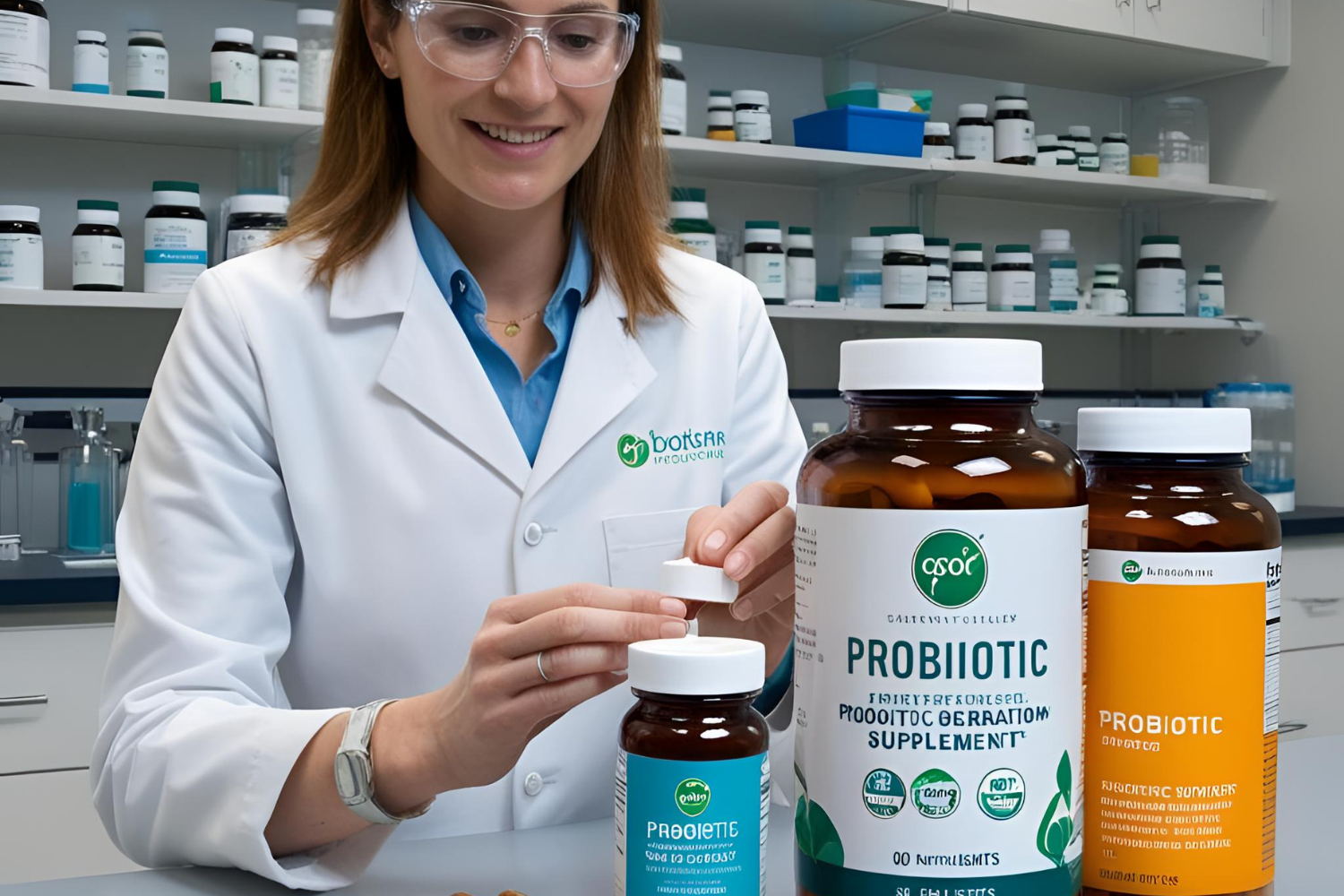Demand for gut health supplements is rising as consumers recognize the gut’s role in digestion, immune health, and overall wellness. A balanced gut microbiome, supported by probiotic supplements, prebiotics, and digestive enzymes, is essential for maintaining digestive balance and a healthy immune system.
Probiotics introduce beneficial bacteria that support digestive health, while prebiotics fuel these microbes, and digestive enzymes aid in breaking down food for optimal nutrient absorption. Understanding the right probiotic strains, supplement forms, and formulation strategies is key to developing effective products that address gut health issues and support overall gut health.
Understanding Gut Health Formulations
Gut health supplements are designed to optimize digestion, improve nutrient absorption, and support microbial balance in the digestive system. Probiotics introduce beneficial bacteria that help maintain a healthy gut, while prebiotics fuel these microbes to thrive.
Digestive enzymes break down macronutrients, aiding in nutrient digestion and supporting absorption processes in the body. These three components enhance digestive health, promote bowel regularity, and strengthen the immune system.

Common Use Cases
Gut health formulations provide targeted support for various digestive and immune functions. These supplements help maintain a balanced gut microbiome, which is essential for overall well-being.
- Supporting healthy digestion and reducing bloating by promoting beneficial bacteria in your gut.
- Formulated to support digestive processes and gut health.
- May support immune health through gut microbiome interactions.
The Three Core Components of Gut Health Formulations
Effective gut health formulations rely on probiotics, prebiotics, and digestive enzymes to maintain digestive balance. Each component plays a unique role in supporting digestive function, nutrient breakdown, and microbial diversity.
Probiotics: The Good Bacteria
Probiotics are live beneficial bacteria that help maintain a balanced gut microbiome, support digestive health, and strengthen the immune system. These microbes assist in breaking down food, producing essential nutrients, and preventing gut dysbiosis. Some probiotic strains have been studied for their potential role in gut health and digestive support, including in individuals with irritable bowel syndrome.
Key probiotic strains for gut health:
- Lactobacillus acidophilus: One of the most well-researched strains, known for its ability to support digestive and immune health.
- Bifidobacterium bifidum: Aids in breaking down dietary fibers, supports immune function, and helps regulate bowel movements.
- Saccharomyces boulardii: A yeast-based probiotic studied for its potential role in gut microbiome balance, particularly for individuals with gut inflammation.

Prebiotics: Fuel for Beneficial Bacteria
Prebiotics are dietary fibers that nourish beneficial gut bacteria, helping them thrive and multiply. They enhance probiotic efficacy, promote gut microbiome diversity, and support digestive balance. Including both prebiotics and probiotics in formulations improves overall gut health by creating an environment where beneficial bacteria can flourish.
Key prebiotic sources:
- Inulin (Chicory Root Fiber): Supports the growth of Lactobacillus and Bifidobacterium.
- FOS (Fructooligosaccharides): Aids digestion and enhances calcium absorption.
- Resistant Starch: Found in green bananas and oats, promoting microbial diversity.

Digestive Enzymes: Breaking Down Nutrients
Digestive enzymes are proteins that break down macronutrients into smaller components for better absorption. They help alleviate bloating, food intolerances, and digestive discomfort by ensuring efficient nutrient breakdown. These enzymes are especially beneficial for individuals with gut health issues related to enzyme deficiencies.
Key digestive enzymes:
- Amylase: Breaks down carbohydrates into simple sugars.
- Protease: Helps digest proteins into amino acids.
- Lipase: Aids in fat digestion and absorption.
- Lactase: Assists lactose digestion, reducing dairy-related discomfort.

Benefits of Offering Gut Health Supplements
The growing awareness of digestive health has increased demand for supplements that support gut function, immunity, and overall wellness. Probiotic supplements, prebiotics, and digestive enzymes provide targeted solutions for consumers looking to improve their digestive system and maintain a healthy gut.
Meeting Consumer Demand for Digestive Wellness
Digestive issues such as irritable bowel syndrome, food intolerances, and gut permeability are becoming more common, driving demand for effective solutions. Probiotic supplementation introduces beneficial bacteria, while prebiotics provide fuel for these microbes, and digestive enzymes aid in breaking down nutrients. These supplements offer a natural approach to supporting digestive health, strengthening the immune system, and promoting overall gut balance.
Expanding Product Lines with a Holistic Approach
Gut health formulations fit seamlessly into broader wellness categories like immune health, detoxification, and weight management. Brands can enhance their offerings by bundling probiotic products with fiber supplements for digestive balance, anti-inflammatory blends for gut permeability support or hydration boosters to improve nutrient absorption. This approach appeals to consumers looking for comprehensive digestive and immune support.
Building Brand Trust with Clinically Supported Formulations
Consumers seek high-quality supplements backed by clinical trials, potency guarantees, and third-party testing. Probiotic capsules with verified colony-forming units help deliver beneficial bacteria, while diverse probiotic strains contribute to gut microbiome diversity. Certifications such as GMP, non-GMO, gluten-free, and dairy-free labeling help brands attract health-conscious buyers and build long-term trust.

Key Ingredients for Effective Gut Health Formulations
A well-formulated gut health supplement includes carefully selected probiotics, prebiotics, and digestive enzymes. Each ingredient plays a role in maintaining digestive balance, supporting gut bacteria, and improving nutrient breakdown.
Probiotic Strains for Optimal Gut Balance
Probiotic foods and supplements contain live bacteria that support digestive health and immune response. Different probiotic strains offer unique benefits for gut function and microbial diversity.
- Lactobacillus rhamnosus: Supports gut lining integrity and digestive health.
- Bifidobacterium longum: Helps break down dietary fibers and regulate bowel movements.
- Streptococcus thermophilus: Aids in lactose digestion and gut function.
Prebiotic Fibers for Probiotic Nourishment
Prebiotic fibers serve as fuel for beneficial bacteria, helping probiotics thrive and maintain digestive balance. Including both prebiotics and probiotics in formulations enhances gut microbiota diversity.
- Galactooligosaccharides (GOS): Stimulates beneficial gut bacteria and enhances digestion.
- Pectin: Found in apples and citrus, it helps regulate gut motility.
- Acacia Fiber: Gentle on digestion while promoting gut-friendly bacteria.
Essential Digestive Enzymes for Nutrient Absorption
Digestive enzymes are key in breaking down food for better nutrient absorption. Including these enzymes in supplements can help individuals with digestive health issues process proteins, fats, and carbohydrates more efficiently.
- Bromelain: Pineapple-derived enzyme that supports protein digestion.
- Papain: Found in papayas, it aids in breaking down proteins.
- Betaine HCL: A compound studied for its role in stomach acid levels and digestive support.
Steps for Nutrition Brands to Develop Gut Health Supplements
Developing effective gut health supplements requires research, high-quality ingredients, and strategic marketing. Brands must focus on formulation, packaging, and consumer education to stand out in a competitive market.
Conduct Market Research to Identify Consumer Needs
Understanding consumer demand is essential for creating products that address specific gut health issues. Key demographics include individuals with irritable bowel syndrome, athletes seeking digestive support, and wellness-conscious consumers looking for a daily probiotic. Trends such as multi-strain probiotic supplements, plant-based enzyme formulations, and dairy-free options continue to gain traction. Researching competitor products and consumer reviews can help identify gaps in the market.
Source High-Quality, Clinically Validated Ingredients
Partnering with trusted suppliers ensures that probiotic strains, prebiotics, and digestive enzymes meet scientific standards. Probiotic strains should be clinically studied for their digestive and immune health benefits, with proven stability and potency throughout shelf life. Choosing gluten-free, non-GMO, and allergen-free ingredients can enhance product appeal to health-conscious consumers.

Formulate for Maximum Synergy
Combining probiotics and prebiotics in a supplement creates a symbiotic effect, promoting the growth of beneficial bacteria in your gut. Including digestive enzymes enhances nutrient breakdown and absorption, making formulations more effective for supporting digestive balance. A well-rounded product with complementary and integrative health benefits can appeal to a wide range of consumers.
Design Packaging and Labels for Consumer Clarity
Clear, informative labeling helps consumers make informed purchasing decisions. Highlighting key benefits such as “supports gut health,” “improves digestion,” and “enhances nutrient absorption” can increase product appeal. Including colony-forming units (CFUs) for probiotics and enzyme activity units ensures transparency and builds trust. Packaging should also emphasize features like gluten-free, dairy-free, and clinically tested ingredients.
Launch and Market Strategically
A strong marketing strategy helps educate consumers and drive sales. Content marketing, webinars, and social media campaigns can highlight the health benefits of probiotic supplementation. Partnering with healthcare professionals to suggest probiotics for specific needs adds credibility. Offering free trials or sample packs encourages first-time purchases and builds customer loyalty.

Marketing Strategies for Gut Health Supplements
Effective marketing educates consumers and positions gut health supplements as essential for digestive and immune health. A combination of content, influencer partnerships, and strategic pricing can drive sales and brand recognition.
Educate Consumers About the Gut Microbiome
Consumers are increasingly interested in how gut health affects digestion, immunity, and metabolism. Sharing educational content on the gut-brain connection and the role of probiotic foods can boost engagement. Using infographics and videos to explain probiotic strains, prebiotics, and digestive enzymes helps simplify complex topics and highlight their health benefits.
Partner with Wellness Influencers and Nutritionists
Collaborating with gut health experts, nutritionists, and functional medicine practitioners can increase credibility. Influencers in the wellness space can demonstrate how probiotic supplements support digestive health and overall gut balance. Featuring real customer testimonials and case studies helps build trust and showcase proven benefits.
Offer Value with Bundles and Subscriptions
Consumers looking for long-term digestive support benefit from bundled products and subscription models. Creating digestive wellness kits that combine probiotics, prebiotics, and digestive enzymes can provide a comprehensive approach to gut health. Subscription-based pricing encourages consistent use while improving brand loyalty and repeat purchases.

The Future of Gut Health Supplements: Opportunities for Brands
Probiotics, prebiotics, and digestive enzymes can affect digestive health, immune function, and gut microbiome balance. As consumer interest in digestive wellness grows, brands have the opportunity to lead the market with clinically validated formulations.
Using high-quality ingredients and transparent labeling builds trust and ensures product efficacy. With increasing demand for digestive health solutions, brands that invest in research-backed supplements can establish themselves as leaders in the expanding gut health category.
Frequently Asked Questions
What certifications should gut health supplements have?
GMP certification, non-GMO, gluten-free, and third-party testing ensure quality and safety.
How long does it take to develop a gut health supplement?
Typically 6–12 months, including formulation, stability testing, and regulatory compliance.
What are the most effective probiotic strains for gut health?
Lactobacillus acidophilus, Bifidobacterium bifidum, and Saccharomyces boulardii.
Can probiotics, prebiotics, and digestive enzymes be taken together?
Yes, they work synergistically to enhance digestion, gut microbiome health, and nutrient absorption.
How should gut health supplements be stored?
Some probiotics require refrigeration, while shelf-stable strains can be stored at room temperature.
References
- Ianiro, G., Pecere, S., Giorgio, V., Gasbarrini, A., & Cammarota, G. (2016). Digestive Enzyme Supplementation in Gastrointestinal Diseases. Current drug metabolism, 17(2), 187–193. https://doi.org/10.2174/138920021702160114150137
- National Institutes of Health. (2017). Irritable Bowel Syndrome (IBS). https://www.niddk.nih.gov/health-information/digestive-diseases/irritable-bowel-syndrome
- National Institutes of Health. (2018). Lactose Intolerance. https://www.niddk.nih.gov/health-information/digestive-diseases/lactose-intolerance
- National Institutes of Health. (2023). Probiotics – Health Professional Fact Sheet. https://ods.od.nih.gov/factsheets/Probiotics-HealthProfessional/
- Qin, Y. Q., Wang, L. Y., Yang, X. Y., Xu, Y. J., Fan, G., Fan, Y. G., Ren, J. N., An, Q., & Li, X. (2023). Inulin: properties and health benefits. Food & function, 14(7), 2948–2968. https://doi.org/10.1039/d2fo01096h



